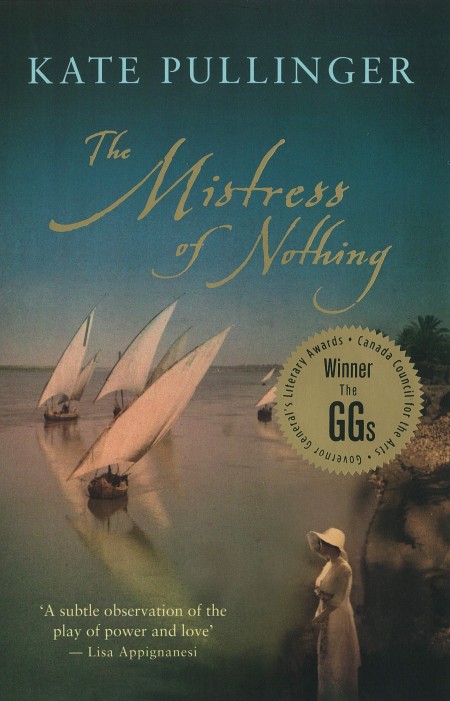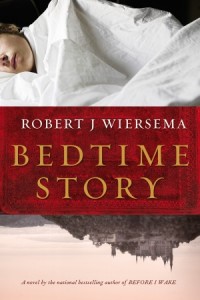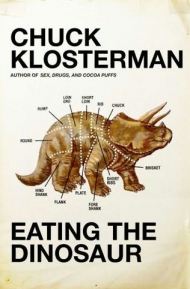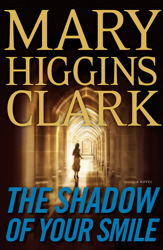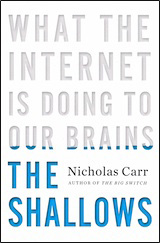
The Shallows is one of those books that has struck a chord (or dis-chord) with web enthusiasts. In my opinion, Carr is right about a lot of things but his choice of examples weakens his argument (they are often too subjective vs. objective).
First my assumption about the definitions of shallow thought vs. deep thought:
Shallow thought = easily accessing information, wisdom of the crowd, synopsis and sound bites
Deep thought = critical thought, longer engagement, in-depth analysis, full detailed reading
NOTE: Having shallow thoughts does not make you a shallow individual.
The Shallows is ironically the first book I read on my iPhone. Ironic because in some ways Carr is lobbying against the technology that allows for digital reading (not that he’s against reading, but he argues that the distractions of digital reading lead to shallow thought).
The Shallows stimulated the academic part of my brain in a way that I miss. But I haven’t made time to write an intelligent review so instead here are my notes, which my future self will appreciate but may be annoying for you. Apologies for the lack of cohesion.
5 Points Carr Makes & Some Reference Notes
1. Is technology inherently good or bad?
Wrong question. But if you choose to answer it:
The shallow-thought argument would be that guns aren’t bad, it’s people who use guns for bad things who are bad.
The deep-thought counter-argument would say: what about medicine? Medicine is good, but when we take too little or too much, we are making a poor decision.
Technology is not good or bad, but (like medicine) it has an intended use, which could be good or bad depending on the intention behind its design. Technology is logic engineered by humans, which prompts certain behaviours in us.
Like all technology, the internet is an invention in response to particular challenges. It provides improvements, but it can also prompt certain behaviours and reward those desired behaviour–like skimming instead of reading or relying on the comments of others to form our opinions (without reading the original source materials ourselves).
The warning highlighted by Carr’s example behaviours is that how we use the internet is chipping away at our capacity for concentration and contemplation and that we need to be aware of the brain pattern changes we are developing as a result of our dependence and daily internet use.
2. You are what you eat. Practice makes perfect.
Junk food is delicious and for many evolutionary reasons we crave fatty foods and sugars. Even though our bodies want these things, we need to moderate our intake. Same with how we read.
The internet can act like junk food for our mind because it rewards jumping from one thing to the next. Our brain craves new information and enjoys this form of reading, but practicing only this form of reading makes us perfect at it, which means we lose the reward sensations and ability to indulge in long-form reading–we get out of practice.
Even though our brains want to create these new paths for multi-task reading, we need to moderate ourselves and ensure we are not losing the pathways that help us think analytically, rationally, and with deeper insights and attention.
(Apparently it’s not like riding a bike, you need to keep practicing or exercising these circuits, or paths in the brain, in order to retain this ability.)
3. We are just starting to understand the mind
Brain plasticity is still a new concept to neuroscience. We used to believe that our brain pathways were malleable only in childhood and that you couldn’t teach an old dog new tricks. But nerve paths are not fixed, they can and do re-route for all sorts of reasons.
Descarte believed in the physical brain and the ethereal brain. The ethereal brain (or the conscious mind) is the essence of the self. This brain existed outside of space, beyond the laws of matter. Each brain could influence the other.
The conscious mind and the unconscious mind are still misunderstood and continue to be researched.
Jung and Freud theorized about the unconscious mind driving behaviour, and new research out of UBC shows that an unconscious mind is at work. (Georgia Straight)
In the UBC study, a group of research subjects were asked a set of general-knowledge yes-or-no questions. If the subjects did not know the right response, or even have an inkling, they were instructed to use a Ouija board. Turns out that they were able to answer significantly more questions accurately when they consulted the Ouija board.
The experiment demonstrated that there is an unconscious mind at work that can bypass the conscious mind and reveal knowledge stored unconsciously. (Think about drivers who zone out yet are able to travel safely through traffic.)
4. We are just starting to understand the brain
Michael Merzenich performed several studies with monkeys that showed how damaged neural pathways can be corrected.
In addition to Merzenich’s research, at the University of Alabama, there is a program pioneered by a neuroplasticity researcher named Edward Taub to help stroke patients. For as many as 8 hours a day, 6 days a week, stroke patients use their paralyzed hand/arm to perform routine tasks over and over again. One day they might wash a window, the next trace letters of the alphabet. The repeated actions are means of coaxing the neurons and synapses to form new circuits that take over the functions once carried out by the circuits damaged in the brain. In a matter a weeks, most regain nearly all movement.
Beyond that, Lee Gerdes, computer geek turned brain researcher, has developed a way to move beyond biofeedback and neurofeedback with brainwave optimization. His Brain State Technology is said to optimize your brain and improve your memory.
5. Our tools become extensions of our thoughts and of our bodies
Carr starts out with a reminder of how clocks altered our sense of time, and maps altered our sense of place.
Those familiar with Ivan Illich, who wrote Tools for Conviviality in 1973, know his argument that we need convivial tools as opposed to machines. Tools accept more than one utilization, tools accept expression from its user, whereas computers are not tools, they are machines, and humans become servants to those machines. Our role is to run the machine in a singular way.
(Yes, we can argue our way out of that one easily.)
Carr, however, makes some solid points about how the internet rewards certain behaviours over others, suggesting that the machine teaches us how to use it most efficiently. These new tricks are rewriting the old dog’s brain.
Carr’s cited research, for example, shows that a London cabbies’ brains are different: they’ve experienced both anatomical and functional changes in the hippocampus and other areas involving spatial modeling and memory.
And that circuitry has quickly been rearranged with the use of GPS. It’s gotten weaker. As a personal example, think of the number of phone numbers you used to remember and how reliant you are on your computer or phone to now store those numbers.
Games like Brain Age force those circuits to continue to work. We can train our brain, which I think of as brain exercise.
Our body, and our brain, is in a constant state of degeneration and regeneration. If you don’t know which state you’re in, it’s certainly in decline.
Random Additional Thoughts
Since my brain is dulled by the very things Carr is warning us about, I can’t finish this review. But you likely can’t read anymore anyway since you’re as out of practice as I am. So now, here are a couple of unfinished points that may or may not make sense.
1. Transitions
The fact that we have a book at all about how the internet is affecting our brain indicates that we are still in a time of transition. The internet is still remarkable for many of us, but this will change.
Few of us walk into a room and remark on electricity and how exciting it is that we can access this light 24/7 by simply flipping a switch. And I’m hard pressed to find someone wary of this technology and how it affects our biological makeup. (Give it up Carr, as the critics have RT’d.)
2. Pause and Reflect
Web enthusiasts who vehemently embrace the internet and its virtues should re-visit Plato’s Phaedrus (4th century BC).
In the story, Theuth describes the art of writing to Thamus and argues that it will make the Egyptians wiser and improve their memory.
Thamus disagrees saying that the inventor cannot be the judge of his own invention. “O man full of arts, to one is it given to create the things of art, and to another to judge what measure of harm and of profit they have for those that shall employ them. And so it is that you, by reason of the tender regard for the writing that is your offspring, have declared the very opposite of its true effect.”
I agree with this point. We are currently the inventors of the internet and the harm and profit of this new form of writing, research, communication, entertainment and engagement can be reasoned either way, but we are not far enough away from it to judge its true effect.
I am relieve though that the anxiety about the introduction of writing is similar to those of widespread internet use.
Should the Egyptians learn to write, Thamus warned, “it will implant forgetfulness in their souls: they will cease to exercise memory because they rely on that which is written, calling things to remembrance no longer from within themselves, but by means of external marks.”
Ah ha, proclaim the defenders of the web!
Yet perhaps the effects of the internet on our memory is not like writing and photographs. Perhaps it is more like video, which seems to replace our memory of an event vs. photographs that serve to reinforce the memory. Has anyone done research on this? Must ask the internet.
3. Wisdom of the Crowd vs. Following the Crowd
The internet certainly does give us access to a wide variety of material, so wide that we require search engines to sort by date or relevancy. The warning message from Carr is that we are letting the search engines (and the power of the crowd) determine relevancy, which creates less diversity in our source materials. We’re following the crowd.
The introduction of writing allowed us to increase our collective knowledge. In a purely oral culture, we were dependent on human memory. Writing resulted in advances in medicine, history and philosophy. It allowed us to build on each others’ thoughts across time and geographical divides. Computer science amplified the possible computational answers available to us.
As Carr notes: Darwin’s On the Origin of Species, Einstein’s Relativity, Keynes’ General Theory of Employment, Interest and Money, Thomas Kuhn’s Structure of Scientific Revolution and Rachel Carso’s Silent Spring are momentous intellectual achievements that would not have been possible without the changes in reading and writing–and in perceiving and thinking–spurred by the efficient reproduction of long forms of writing on printed pages.
But with search engines, you’d expect academic writing to reference more and more sources since we have access to more materials. Carr says this isn’t the case, we are citing fewer results. We’re referencing what others have referenced vs. seeking our own path and conclusions.
4. Practice
Like Carr, I also believe we need to practice concentration, memory, and retention of details. Being able to multitask well and hold the thread for a longer period of time is dependent on these skills.
As the Roman philosopher Seneca said, “to be everywhere is to be nowhere.”
Or as Johnson says to Boswelll, “knowledge is of two kinds. We know a subject ourselves, or we know where we can find info upon it.”
Carr argues that “what the net diminishes is Johnson’s primary kind of knowledge: the ability to know, in depth, a subject for ourselves, to construct within our own minds the rich and idiosyncratic set of connections that give rise to a singular intelligence.”
Knowing how to search for something is not the same as knowing by mental recall.
5. Knowledge
David Foster Wallace in a commencement address at Kenyon College in 2005 stated that learning how to think really means learning how to exercise some control over how and why you think. It means being conscious and aware enough to choose what you pay attention to and to choose how you construct meaning from experience.
I believe we are in a time of bricolage. Like Montesorri learning, we add layer upon layer of meaning until we have a complete picture.
If a learned individual is reading a novel, for example, they have a more informed reading than someone who is less learned. As the learned individual reads, they access deeper meaning through the layers of context they can bring to the work. I think this is the deep thought Carr values and wants us to retain. I have no argument with that.
In Conclusion, If there can be such a thing for this rambling post
One word. Exciting!
So what’s next in the internet? I’m hopeful that something new and extraordinary will occur.
But I certainly don’t want to those layers of meaning and understanding to developed because of what Amazon search decides to present to me based on who paid what for their listing to appear, or Google based on its determination of relevancy and wisdom of the crowd.
Just as Nietzsche noticed how his writing style changed as he moved from handwriting to typewriting, “Our writing equipment takes part in the forming of our thoughts”, I notice that the computer has become an extension of my memory.
Sure great. But I also see that, when disciplined, my mind can gather and access knowledge while staying the course (maintaining a sequence of deeper thoughts) without being distracted in a way that is infinitely more rewarding than bumping along through twitter.
What do you think?
UPDATE August 1, 2011
Columbia University psychologist Betsy Sparrow agrees that the Internet and search engines like Google have changed the way our brain remembers information. Her research was published July 14 in Science.
Sparrow’s research shows that we do indeed forget things we are confident we can find on the Internet. We are more likely to remember things we think are not available online. And we are better able to remember where to find something on the Internet than we are at remembering the information itself.
But Sparrow doesn’t see this as a bad thing. Hers is the first research of its kind into the impact of search engines on human memory organization and she feels that we don’t have enough data to say that it is good or bad.
Sparrow’s paper in Science is titled, “Google Effects on Memory: Cognitive Consequences of Having Information at Our Fingertips.” With colleagues Jenny Liu of the University of Wisconsin-Madison and Daniel M. Wegner of Harvard University, Sparrow explains that the Internet has become a primary form of what psychologists call transactive memory, recollections that are external to us but that we know when and how to access.
I’m putting this info here so that I can find it later, ha ha.


